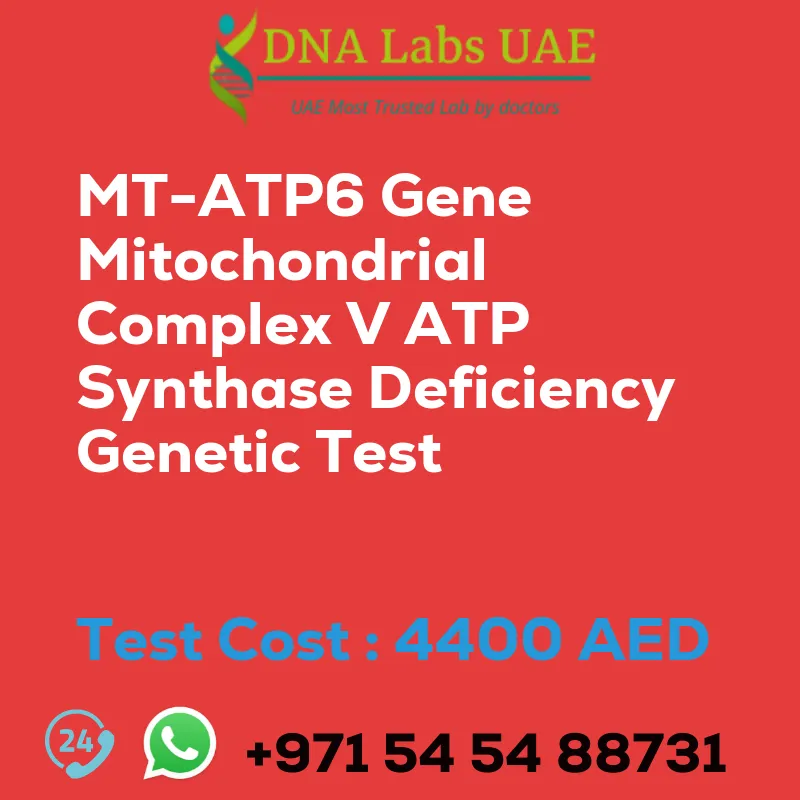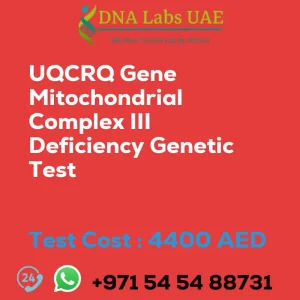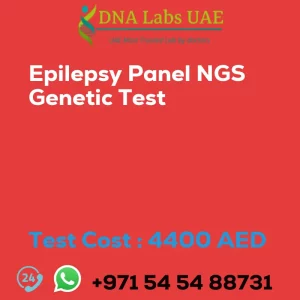MT-ATP6 Gene Mitochondrial complex V ATP synthase deficiency Genetic Test
Test Name: MT-ATP6 Gene Mitochondrial complex V ATP synthase deficiency Genetic Test
Components: Blood or Extracted DNA or One drop Blood on FTA Card
Price: 4400.0 AED
Sample Condition: Blood or Extracted DNA or One drop Blood on FTA Card
Report Delivery: 3 to 4 Weeks
Method: NGS Technology
Test type: Neurological Disorders
Doctor: Neurologist
Test Department: Genetics
Pre Test Information: Clinical History of Patient who is going for MT-ATP6 Gene Mitochondrial complex V (ATP synthase) deficiency NGS Genetic DNA Test. A Genetic Counselling session to draw a pedigree chart of family members affected with MT-ATP6 Gene Mitochondrial complex V (ATP synthase) deficiency.
Test Details
MT-ATP6 gene mitochondrial complex V (ATP synthase) deficiency is a genetic disorder that affects the function of the ATP synthase enzyme, which is involved in the production of ATP (adenosine triphosphate) in the mitochondria. This deficiency can lead to a variety of symptoms, including muscle weakness, exercise intolerance, developmental delays, and neurological problems.
NGS (Next-Generation Sequencing) genetic testing is a type of genetic test that uses high-throughput sequencing technologies to analyze multiple genes simultaneously. In the case of MT-ATP6 gene mitochondrial complex V deficiency, NGS genetic testing can be used to identify mutations or variations in the MT-ATP6 gene that may be responsible for the disorder.
NGS genetic testing involves the extraction of DNA from a patient’s sample (usually blood or saliva), followed by the sequencing of the MT-ATP6 gene using advanced sequencing platforms. The resulting sequence data is then compared to a reference sequence to identify any genetic variations or mutations that may be present.
This type of genetic testing can provide valuable information for diagnosis, prognosis, and treatment decisions for individuals suspected of having MT-ATP6 gene mitochondrial complex V deficiency. It can also help identify carriers of the disorder and provide information for family planning purposes.
It’s important to note that NGS genetic testing may not be available in all healthcare settings and may require specialized laboratories or genetic testing centers. Additionally, the interpretation of the test results should be done by a qualified healthcare professional or genetic counselor who can provide appropriate counseling and guidance based on the specific genetic findings.
| Test Name | MT-ATP6 Gene Mitochondrial complex V ATP synthase deficiency Genetic Test |
|---|---|
| Components | |
| Price | 4400.0 AED |
| Sample Condition | Blood or Extracted DNA or One drop Blood on FTA Card o |
| Report Delivery | 3 to 4 Weeks |
| Method | NGS Technology |
| Test type | Neurological Disorders |
| Doctor | Neurologist |
| Test Department: | Genetics |
| Pre Test Information | Clinical History of Patient who is going for MT-ATP6 Gene Mitochondrial complex V (ATP synthase) deficiency NGS Genetic DNA Test A Genetic Counselling session to draw a pedigree chart of family members affected with MT-ATP6 Gene Mitochondrial complex V (ATP synthase) deficiency |
| Test Details |
MT-ATP6 gene mitochondrial complex V (ATP synthase) deficiency is a genetic disorder that affects the function of the ATP synthase enzyme, which is involved in the production of ATP (adenosine triphosphate) in the mitochondria. This deficiency can lead to a variety of symptoms, including muscle weakness, exercise intolerance, developmental delays, and neurological problems. NGS (Next-Generation Sequencing) genetic testing is a type of genetic test that uses high-throughput sequencing technologies to analyze multiple genes simultaneously. In the case of MT-ATP6 gene mitochondrial complex V deficiency, NGS genetic testing can be used to identify mutations or variations in the MT-ATP6 gene that may be responsible for the disorder. NGS genetic testing involves the extraction of DNA from a patient’s sample (usually blood or saliva), followed by the sequencing of the MT-ATP6 gene using advanced sequencing platforms. The resulting sequence data is then compared to a reference sequence to identify any genetic variations or mutations that may be present. This type of genetic testing can provide valuable information for diagnosis, prognosis, and treatment decisions for individuals suspected of having MT-ATP6 gene mitochondrial complex V deficiency. It can also help identify carriers of the disorder and provide information for family planning purposes. It’s important to note that NGS genetic testing may not be available in all healthcare settings and may require specialized laboratories or genetic testing centers. Additionally, the interpretation of the test results should be done by a qualified healthcare professional or genetic counselor who can provide appropriate counseling and guidance based on the specific genetic findings. |








